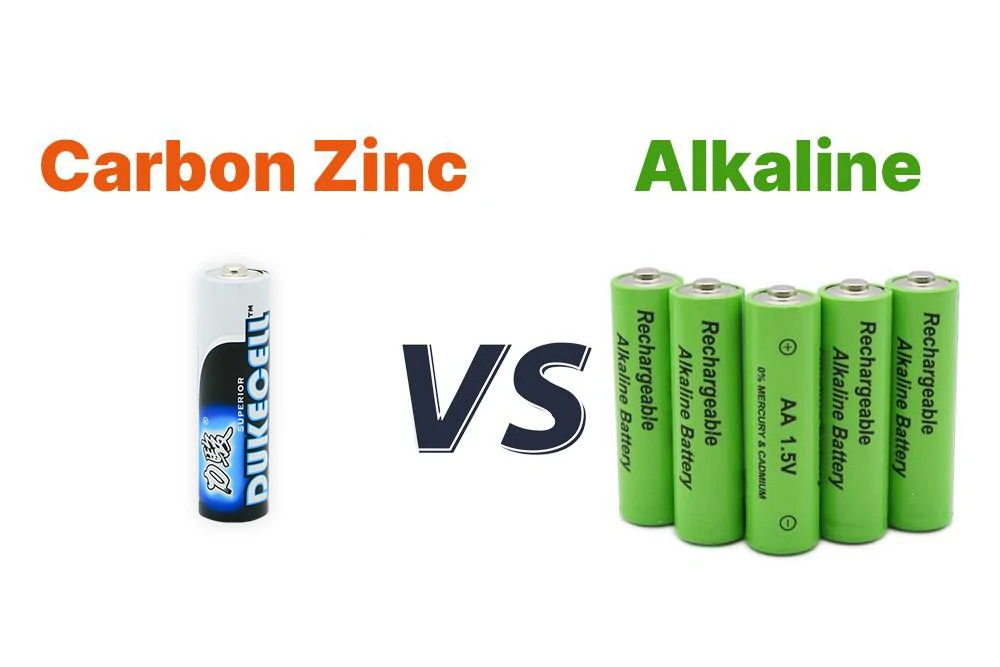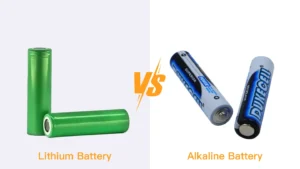the differences between alkaline and non-alkaline batteries
In the field of battery technology, alkaline and non-alkaline batteries are two main types of batteries, which have significant differences in performance, cost, and applications.
Now I will take you through the characteristics of these two types of batteries in detail, and analyze “are alkaline batteries good” and “alkaline batteries vs non-alkaline batteries”.

Alkaline Batteries
Alkaline batteries, commonly known as “alkaline battery,” are batteries that use an alkaline electrolyte, with chemical components including zinc and manganese dioxide. They are known for their high energy density and longer self-discharge rates.
How do alkaline batteries work?
The working principle of alkaline batteries is based on the chemical reaction between zinc and manganese dioxide. Zinc oxidizes at the anode, releasing electrons that flow through the circuit to the cathode. At the cathode, manganese dioxide reacts with hydroxide ions to form water and manganese oxides. The flow of electrons in this process generates an electric current.
Alkaline batteries are essentially a closed chemical reaction. Each battery consists of an anode, a cathode, and electrolyte materials that facilitate the transfer of electrons. In a standard alkaline battery, the cathode is made of manganese dioxide, which forms a layer on the inside of the battery casing. The anode is composed of zinc powder dispersed in the electrolyte solution. Potassium hydroxide is the standard electrolyte solution for alkaline batteries. Other components in the battery include a separator that keeps the anode and cathode electrically isolated and a collector that captures electrons.
What are the advantages of alkaline batteries?
- High energy output: “Alkaline batteries” provide much higher energy output than “non-alkaline batteries,” making them an ideal choice for devices that require high energy output, such as power tools, flash lights, and portable gaming consoles.
- Longer service life: At low to moderate discharge rates, the service life of “alkaline batteries” is usually longer than that of “non-alkaline batteries.” For example, they can last for months or even years, depending on usage.
- Wide range of applications: “Alkaline batteries” are suitable for a variety of devices, from remote controls to toys, as well as portable electronic devices such as wireless mice, smoke detectors, and digital cameras.
Do alkaline batteries have disadvantages?
- Higher cost: Compared with “non-alkaline batteries,” “alkaline batteries” are usually more expensive. This is mainly because their manufacturing process is more complex and requires more raw materials.
- Environmental impact: “Alkaline batteries” contain heavy metals, such as mercury, which are harmful to the environment and need to be properly disposed of. The correct methods of disposal include recycling and safe disposal to reduce environmental pollution.
- Memory effect: If the battery is recharged without being fully discharged, its performance may be reduced. This can lead to a decrease in battery capacity and affect the service life of the battery.
Non-Alkaline Batteries
“Non-Alkaline Batteries” , also known as carbon-zinc batteries or zinc-manganese batteries, use a neutral or slightly acidic electrolyte. They are one of the oldest types of batteries on the market.
What are the advantages of non-alkaline batteries?
- Cost Effectiveness: “Non-Alkaline Batteries” are generally cheaper than “Alkaline Batteries”, making them a choice for consumers with limited budgets. For example, they are commonly used in disposable or low-cost devices.
- Environmentally Friendly: Modern “Non-Alkaline Batteries” typically do not contain mercury, which has a smaller impact on the environment. This means they can be disposed of more safely, reducing potential environmental hazards.
- Suitable for High-Drain Devices: “Non-Alkaline Batteries”perform well in devices with high discharge rates, such as electric toys and handheld game consoles. For example, they are often used in children’s toys and remote controls.
Alkaline Battery vs Regular Battery
When choosing batteries, the following factors should be considered:
- Energy Density: Alkaline batteries typically have a higher energy density than regular batteries, meaning they can hold more energy in the same volume.
- Cost: Regular batteries (non-alkaline batteries) are usually cheaper than alkaline batteries, making them more attractive in cost-sensitive applications.
- Service Life: The service life of alkaline batteries is usually longer than that of regular batteries, making them ideal for applications that require long-term use without the need to replace batteries.
- Voltage: The nominal voltage of alkaline batteries per cell is 1.5 volts, while the voltage of regular batteries (such as zinc carbon batteries) may be lower. This means that alkaline batteries can provide a more stable voltage and stronger power for devices.
- Applicability: Alkaline batteries are suitable for high-drain devices such as digital cameras, toys, and handheld gaming consoles, while regular batteries are more suitable for low-drain devices such as remote controls and clocks.
- Environmental Impact: Alkaline batteries may contain heavy metals harmful to the environment, such as mercury, and need to be disposed of properly. In contrast, many modern regular batteries are designed to be more environmentally friendly and do not contain these harmful substances.
- Safety: Alkaline batteries can reduce their performance or even pose safety risks if charged without being fully discharged. Regular batteries are generally considered safer as they are less likely to leak or pose dangers in case of damage.
- Rechargeability: Some regular batteries, such as nickel-metal hydride batteries, are rechargeable, while alkaline batteries are usually disposable and not rechargeable.
- Weight and Size: Alkaline batteries, which use iron casings, are generally heavier than regular batteries. Regular batteries may use lighter materials such as tin alloy, giving them an advantage in applications that require lightweight power sources.
Alkaline Battery vs Regular Battery
When choosing batteries, the following factors should be considered:
- Device Requirements: If the device requires high energy output, an “Alkaline Battery” may be a better choice. For devices with high discharge rates, “Non-Alkaline Batteries”may be more suitable.
- Cost-Effectiveness: If cost is a key factor, “Non-Alkaline Batteries” may be a more economical choice.
- Environmental Considerations: Considering the environmental impact, choose a battery type that does not contain harmful substances.
Non-Alkaline AA Batteries
Non-Alkaline AA batteries are a type of “Non-Alkaline Batteries”, and they are very common in home and commercial applications. Compared to “Alkaline Battery”, “Non-Alkaline AA Batteries” are generally more economical but may not be suitable for devices that require high energy output.
The choice between “Alkaline and Non-Alkaline Batteries” depends on various factors, including device requirements, cost-effectiveness, and environmental considerations. As technology advances, the performance and sustainability of batteries continue to improve, providing consumers with more options. In the battery industry, understanding these differences is crucial for optimizing product performance and meeting consumer needs. As environmental awareness increases, the development of more environmentally friendly and efficient battery solutions will become a future trend in the industry.




